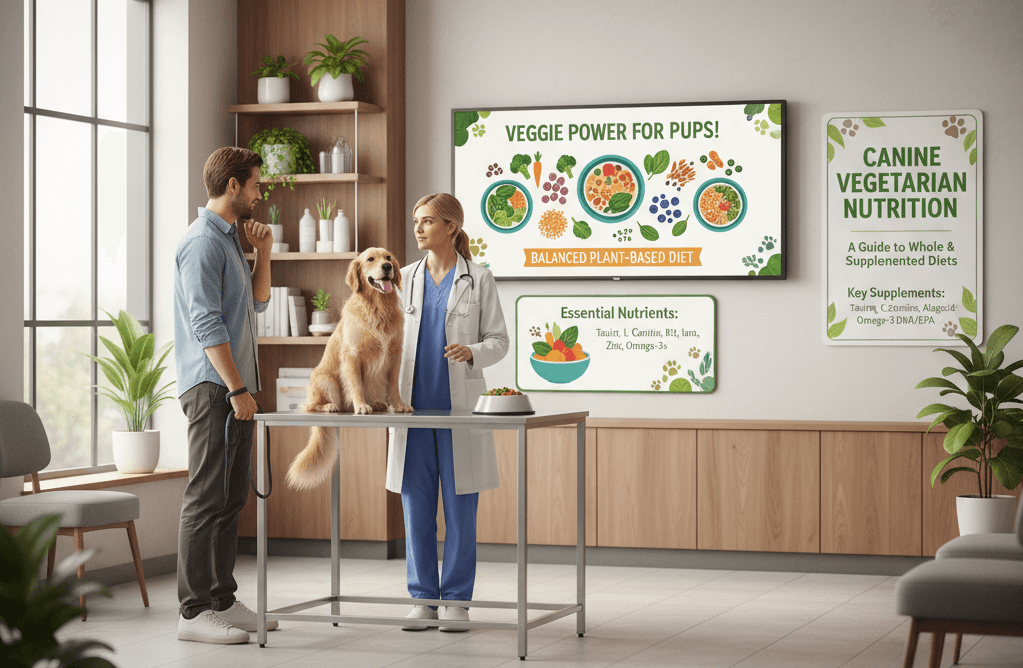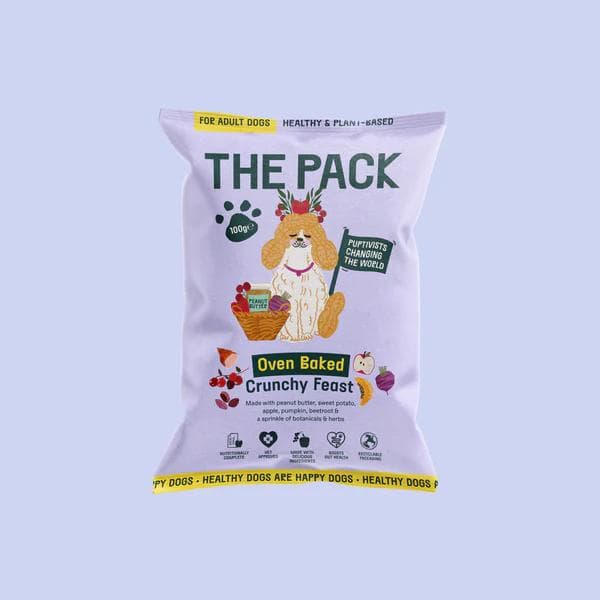Key Takeaways
- Meat proteins are common allergies for dogs: Animal proteins, such as beef, chicken, or lamb, are the main cause of many dog food allergies. This makes vegetarian options a good hypoallergenic choice.
- Vegetarian diets help with allergies: Plant-based diets get rid of common allergens and provide balanced nutrition, which can help with problems including itching, digestive problems, and inflammation.
- Plant-based ingredients provide full nutrition: Lentils, chickpeas, quinoa, and peas are all good sources of protein that dogs need for their health, growth, and immune system.
- ** For a successful transition, it should happen slowly:** Add plant-based foods to your dog's diet over the course of 7 to 10 days, keeping an eye on how they adapt to avoid stomach problems.
- veterinarian guidance assures safe implementation: Working with a veterinarian nutritionist makes ensuring that dietary changes meet all nutritional demands, such as those for iron, zinc, and vitamins B12 and D.
- Vegetarian diets target certain allergy types: These diets are good for those who are allergic to certain foods, but they won't help with allergies caused by the environment or fleas, which need different solutions.
- Before making adjustments to your diet, it's important to get a diagnosis. Allergy testing, including elimination diets or food trials supervised by a veterinarian, finds precise triggers so that you don't have to make unneeded modifications.
Vegetarian diets can help dogs with food allergies and improve their overall health, so they are a good way to deal with allergies. In the next parts, we'll talk about the health benefits of plant-based diets, how to follow them correctly, and how to manage allergies over the long term.
Introduction
Seeing your dog itch all the time, have stomach problems, or be in pain is distressing. Food allergies, which are commonly caused by proteins in beef, poultry, or lamb, are a hidden cause for many pets. These allergic reactions might make them quite sick and unhappy. What if the answer isn't medicine or trying out different store-bought foods over and over again, but a plant-based diet instead?
Vegetarian meals for dogs are becoming more and more popular as a safe, low-allergen option. These diets can help your dog feel better without hurting their nutritional demands by getting rid of common animal protein allergies and adding plant-based foods that are high in nutrients. What happened? Pets that are happier and healthier, and pet owners who are at ease.
In this article, we'll explain how plant-based diets can benefit dogs with allergies, what the best ingredients are, and what experts say you should do to help your dog switch to this allergy-friendly food plan without any problems.
Learning About Dog Food Allergies and Sensitivities
Dog allergies are a common health problem, and food-related reasons are to blame for 10–15% of all cases. Food allergies don't go away with the seasons like environmental allergies do. If you don't treat them, they might cause long-term discomfort. Making the right changes to your dog's diet can be very important for easing symptoms and increasing their general quality of life.
An overactive immune system is what causes food allergies. Some proteins or components in your dog's food are thought to be bad for them, which makes their body react with inflammation every time they eat them. The immunological response can happen right once or over the course of hours, making it harder to find the allergen that caused it. Dogs can also get allergies to foods they've eaten without any problems for years, which makes things much more complicated. This is because sensitivities change with repeated exposure.
Food sensitivities, which are different from allergies, usually affect digestion instead of causing an immunological reaction. Symptoms can be similar, from stomach problems to skin discomfort. A correct diagnosis from a veterinarian is very important to tell the difference between the two and figure out the best way to proceed.
Veterinarians have reported a 23% surge in dog food allergies since 2010, which is a significant increase. This increase may be due to the fact that commercial dog food now has a wider range of ingredients and pet owners are becoming more aware of their options, which shows how important it is to think carefully about what to feed their dog.
Different Kinds of Allergic Reactions in Dogs
Dogs with food allergies can have two kinds of reactions: immediate (Type I hypersensitivity) and delayed (Type IV hypersensitivity). IgE antibodies cause immediate reactions that happen between minutes to a few hours and are distinguished by symptoms like severe itching or swelling of the face. These are easier to spot and deal with if you make quick changes to your diet.
Delayed reactions depend on T-cells and can take up to 72 hours to show symptoms like long-term skin irritation or ear infections. These typically seem like dermatitis, and it can be impossible to figure out which foods are causing the problem without a full exclusion diet supervised by a veterinarian.
Cross-reactivities make things even more complicated. This is when one protein looks a lot like another, which might cause allergy reactions in foods that are related. For example, a dog that is allergic to chicken can also be allergic to duck or turkey. Also, outside factors like drugs or problems with gut health (sometimes dubbed "leaky gut") make people more likely to develop new food allergies, so they need full care.
How to Tell if Your Dog Has Allergies
Signs in the Body
Chronic, painful skin disorders that affect 80% of dogs with allergies are the most obvious indicators of food allergies. Symptoms include constant itching around the ears, paws, and anus, as well as red, irritated regions of skin. Licking the same region over and over makes these problems worse, which can lead to secondary infections like hotspots or yeast overgrowth.
Ear infections are a clear indicator, and they usually don't respond to regular treatments until dietary factors are dealt with. The discharge is dark and waxy and has a distinct smell. These skin problems often come with stomach problems including diarrhoea, vomiting, and too much gas. Some dogs even get long-term problems like inflammatory bowel disease.
In very bad but rare cases, food allergies can cause breathing problems including coughing or wheezing. This can lead to serious anaphylactic reactions that need immediate medical attention.
Signs of Behaviour
Your dog's behaviour can also change if they are in pain all the time. Food allergies often make people irritable, restless, and more agitated. If you keep licking or scratching your paws, it might become compulsive and cause serious injuries to yourself. Changes in appetite, such as not wanting to eat or feeling very hungry, can also be an indication of nutritional deficits caused by long-term inflammation.
When your dog is constantly itching or in discomfort, it can cause psychological stress that makes them less playful or interested, which can be shown in their behaviour. Recognising these signs early and taking your pet to the clinic is the best way to help them feel better.
Common Foods That Dogs Are Allergic To
Allergens Based on Protein
Animal proteins are the most common allergies. Chicken, which is in a lot of commercial dog diets, is the main cause of food allergies in dogs, affecting about 20% of them. Beef is another typical trigger that might cause reactions with lamb or venison since their proteins are similar in structure. Fish proteins and dairy products are sold as substitutes, but these can also trigger responses in a lot of dogs, especially those who are sensitive to casein and lactose.
Carbohydrate and grain allergens
Grains like maize and wheat are less likely to cause problems, but they can still cause problems, especially in dogs with weak immune systems. Soy, which is typically used as a filler or protein alternative, can cause allergies and may also mess with hormones because it contains phytoestrogens. When rice is made, it might get contaminated with other foods, which can be dangerous.
Additives and Fake Ingredients
Chemical preservatives like BHA and BHT and artificial colourants like Red Dye #40 often make sensitivity worse, in addition to natural components. These additives don't provide any nutrients and are easy to get rid of when you choose hypoallergenic or vegetarian formulas.
In conclusion,
To deal with dog food allergies, you need to pay close attention, get advice from a vet, and make careful changes to your dog's diet. Knowing the difference between allergies and sensitivities lets you make specific dietary changes that ease not only physical pain but also the emotional and behavioural effects of long-term disorders.
Vegetarian diets are a good option for dogs with food sensitivities because they can help with common allergens without affecting their nutrition. Plant-based foods are a complete way to keep dogs healthy since they have lentils, quinoa, and peas, which are all good sources of protein and other nutrients. Avoiding chemicals and recognised triggers, on the other hand, helps long-term health.
In the end, being careful and working with veterinarians are the most important things. Taking care of your dog's allergies before they become a problem will not only make them healthier, but it will also make their life better. Pets depend on us to read the indications and do something about them, which makes you an important part of their health journey. Let every meal show how much you care about their health and happiness.





